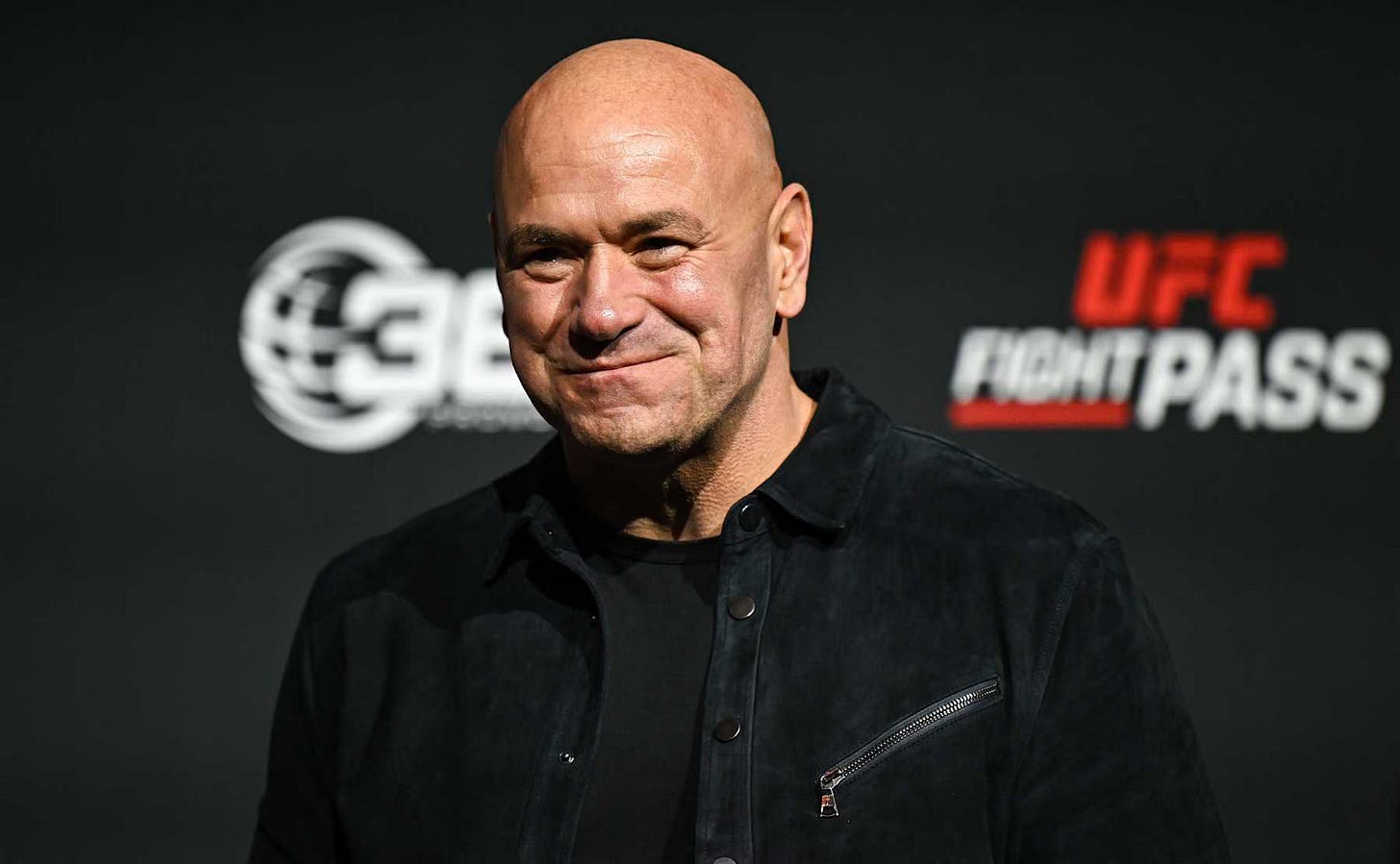When Dana White became president of the UFC in 2001, it was on the brink of bankruptcy. Upon purchase, all he and his partners received was the brand name and a used octagon. It looked like a non-starter; an unproven entity operating on the fringes of violent athletics, and nobody took it seriously.
Today, it’s the most influential institution in combat sports.
In the face of countless naysayers, under Dana’s stewardship, the starmaking MMA promotion became a phenom: selling millions of pay-per-views, redefining the culture of fighting, and launching the careers of Rhonda Rousey, Anderson Silva, Jon Jones, and Conor McGregor. Today, its value is estimated at over $11 billion.
Earlier this year, he was elected to Meta’s board of directors.
Why did we invite him on?
Dana White is one of the biggest personalities in all of media. He’s outspoken on politics, his business, and never watches his mouth. That alone makes him an ideal candidate for Triggernometry.
But more compelling than that even is his unlikely rise to fame. Every UFC is a wince-inducing form of entertainment that more often resembles a streetfight than an athletic bout. The gentlemanly veneer of boxing is nowhere to be found; blood hits the canvas and heads bounce off it.
In modern civilisation, we claim to hate violence. So why is it so popular? Why do millions tune in to watch it? Dana seemed to be the man to ask.
He’s been on the wishlist for years now, and when the opportunity to talk to the man behind the most-talked-about brand in sport came up, we knew we couldn’t turn it down.
What did we talk about?
”The fight business is a sexy business. As soon as someone gets the money, they want to be in it. But it’s one of the hardest businesses in the world to run and to navigate. There are people who are a lot smarter than me and a lot richer than me that have a put lot into it, and they failed.”
Eras of sport are defined by gamechangers. Individuals who found new ways to win and, in doing so, revolutionised how its played. Muhammad Ali’s masterful weaving, Wayne Gretzky turning hockey from a game of physicality to one of grace and vision, and Dick Fosbury finding a new way to throw himself over a bar. Dana White might not be athlete, but his success has demonstrated the same kind of lateral mindset - for that, he’s a living legend. And in his mind, for ambitious people that share his way of thinking, the world has never been more welcoming.
”When I grew up, it was very hard to disrupt, and very hard to break in. If there was a massive business that had been around for a long time, it was very hard to compete. Now? It’s the Wild Wst. The world is wide open for the taking, and all these disrupting business have come in.”
When you look back, all things seems inevitable. Today, the UFC is one of the most popular entertainment franchises in the world, and its stars have transceneded their field. It’ evens become the new place-to-be-seen for celebrities; everyone from A-list actors to rockstars, to even Presidents, want their image captured ringside.
But, as Dana readily admits, that wasn’t always the case. How did Dana keep going when success was still a distant dream?
”Well, I believed to my core that the UFC could be massive. Not just in America, but all over the world.”
But why?
”Fighting works everywhere, and I believed this was the most exciting style of fighting. I love boxing, but this was way more exciting than boxing. You had the stories of the athletes. Chuck Liddell was my first star, and he looked like an axe murderer, but he had a degree in accounting. Every boxing story is ‘If I didn’t have boxing, I’d be dead or in jail.’ People can’t relate to that; every story in the UFC was different.”
So why is fighting so popular? Socially, we’re told it’s just about the worst thing there is. Violence is only acceptable when all other forms of mediation have been exhausted; only when every other possibly avenue is explored can we resort to our hands. As children, we’re scolded for it, and as adults, we’re thrown behind bars. We condemn everyone who participates in it.
Except those who do it professionally.
They’re not just not condemned; they’re lionised.
Why?
”Fighting is the first sport ever. Someone punched someone else, and it was on. It’s in our DNA. We get it, we like it. If a fight broke out right now, we’d all run over and watch. It’s unexplainable. It doesn’t matter what colour you are, where you come from, what language you speak - we all love fighting. And if someone looks like you, talks like you, acts like you, and they’re the baddest dude in the world, you rally around him.”
”Fighting works everywhere” has been true since the dawn of man. Going back to the age of gladiators and certainly further, humans have craved organised (and indeed unorganised) violence. But that seems to run counter to current social trends. Konstantin and Dana observe what they see as a ‘p*ssification’ of the world: the cowing of society that turns people into nervous, self-conscious non-achievers. Afraid to speak their minds, afraid to act on instinct.
Yet, in a time where ‘words are violence’, violence itself is more popular than ever.
Are these trends are connected somehow? Does one contradict the other?




